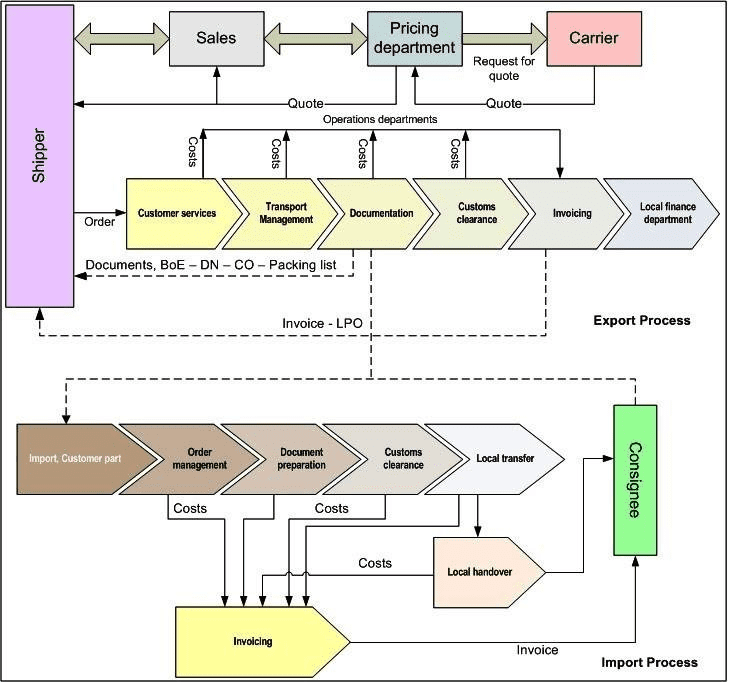An In-depth Look at Freight Forwarding Management Software

Ever thought about how prosperous freight forwarders tackle their tasks in the world of fast-paced global trade and logistics? How do they ensure a smooth flow of information and a balanced distribution of shipments that won’t mess with deadlines or cause bottlenecks?
Well, it looks like these have an ace up their sleeve – as they rely on advanced freight forwarding management software solutions that can be customized to suit their unique needs. Using such software, they can forego time-consuming manual steps and ensure everything automates and runs without any hassles or tensions. It’s quite impressive, don’t you think?
from 25 countries outsourced software development to Relevant
We provide companies with senior tech talent and product development expertise to build world-class software.
So why not explore the possibility of integrating freight forwarding software into your own operations? It may be just what you need to streamline processes and improve efficiency.
Understanding Freight Forwarding
Freight forwarding stands as an indispensable pillar of international commerce, ensuring the smooth transfer of goods across borders. It’s a complex arena that intertwines logistics coordination, adherence to regulations, and proficient management of the supply chain into one comprehensive field.
The freight forwarder’s role in supply chain management
Freight forwarders, also known as non-vessel operating common carriers, act as intermediaries between shippers and carriers, ensuring that shipments are transported safely, economically, and in compliance with international regulations. They leverage their vast network of transportation providers, including air freighters and trucking companies, to negotiate the best prices based on cost, speed, and reliability.
Challenges faced by freight forwarders
Freight forwarders have to navigate the maze of ever-changing international trade rules, customs protocols, and safety standards. Slip-ups here could mean shipment delays, fines, or even seized goods. Then, they have to stay nimble in the face of fluctuating transport rates, fuel costs, and exchange rates. It’s a continuous adjusting pricing strategy to keep up with market conditions.
Peak hours can lead to capacity constraints, testing forwarders’ abilities to secure enough carrier space to meet client needs without impacting operations.
Lastly, they need to maintain supply chain visibility and collaborate effectively with stakeholders. Without this, they risk inefficiencies, increased costs, and decreased customer satisfaction.
Yet, there’s a break in the clouds! With tech advancements like freight management software, these challenges can be solved. By harnessing these business tools, freight forwarders can remain on top, ensuring smooth and efficient delivery of goods, no matter the obstacles they face.

What is Freight Forwarding Software?
Freight forwarding software, also known as logistics software, is an integrated solution designed to streamline operations for freight forwarders.
These modern systems extend beyond mere data repositories. They are comprehensive AI platforms aimed at automating freight processes, enhancing efficiency through the utilization of cutting-edge technologies. They handle the management of various freight modes and warehousing, track shipments, facilitate customs procedures, and deal with documentation. Furthermore, they also maintain vendor and customer relationships, generate quotations, manage billing, and even perform financial accounting tasks.
The era of installing these systems on bulky computer hardware is behind us. In the present day, these systems are predominantly cloud-based, accessible from any location with an internet connection, adding a layer of flexibility to your operations, regardless of whether you’re in the office, at home, or on the go. They interact with other third-party software via Electronic Data Interchange (EDI) and Application Programming Interfaces (APIs), providing complete visibility into your freight forwarding operations and simplifying logistics management.

Types of Freight Forwarding Management Software
As diverse as the challenges in freight forwarding are, there are types of freight forwarding management software designed to tackle them. Prepare to be amazed by the incredible versatility these tools bring to the table!
- Transportation Management Systems (TMS): TMS solutions are specifically built to simplify the entire process of planning, executing, and optimizing the shipment of goods. With TMS, you can effortlessly handle tasks ranging from route planning and carrier selection to freight audit and payment.
- Warehouse Management Systems (WMS): These focus on operations within a warehouse, helping manage inventory levels, pick-and-pack services, and the storage of goods. A good WMS can significantly improve your warehousing efficiency.
- Supply Chain Management Software (SCMS): SCMS is an integrated system designed to manage and optimize every facet of the supply chain. It encompasses everything from sourcing and manufacturing to distribution and final delivery, providing a comprehensive overview of the entire supply chain process. By the way, if you’re seeking sophisticated supply chain management software, we’ve got you covered.
- Enterprise Resource Planning Systems (ERP): ERPs are all-encompassing software suites that unify every facet of a business, spanning from purchasing and operations to distribution and logistics. An ERP system functions as a singular, reliable repository for all your operational data, offering a comprehensive and consistent view of your entire enterprise.
- Customer Relationship Management Systems (CRM): While not exclusively a logistics tool, CRMs play a vital role in managing customer interactions and improving customer service in freight forwarding. They allow companies to track and manage customer information, interactions, preferences, and feedback.
Clearly, the range of options available to you is expansive. However, it’s essential to remember that your freight forwarding management software choice should be predominantly influenced by your business’s distinct needs and operational nuances.
Key features of freight forwarding management software
The ideal freight software should be your one-stop solution, effortlessly handling every operation. We’re talking about managing documentation, facilitating communication, establishing relationships with customers and suppliers, maintaining jobs, generating reports, overseeing financial matters, and much more – all under one roof. You can count on such features of the platform:
- Centralized Dashboard: A user-friendly interface that provides a comprehensive overview of all ongoing operations, enabling users to monitor the status of shipments, track inventory, manage finances, and access essential documentation.
- Shipment Management: Facilitates the planning, execution, and tracking of shipments, offering real-time updates, route optimization, and the ability to manage different transportation modes, including air, sea, rail, and road.
- Documentation and Compliance: Streamlines the creation and management of critical shipping documents, such as bills of lading, commercial invoices, and packing lists, ensuring compliance with international trade regulations and customs requirements.
- Inventory Management: Offers visibility into warehouse stock levels and storage locations, allowing for efficient inventory asset management, stock rotation, and order fulfillment.
- Financial Management: Brings together all financial operations, including invoicing, payments, and expenses. It offers precise financial reporting and analysis, and aids in budgeting and cost control endeavors.
- Customer Relationship Management (CRM): Boosts customer service by meticulously handling customer information, keeping track of past interactions, and fostering interdepartmental collaboration.
- Integration and API: Ensures flawless interaction with external apps and services, such as ERP or TMS systems, and diverse carrier platforms, to name just a few.
How freight forwarding management software works
Curious about how freight forwarding software works? Let’s break it down:
First off, users input shipment details like origin, destination, product specifics, and transport mode. The software links up with carriers, customs, and other bodies to ensure the data is accurate and current. Next, the software maps out the most efficient shipping routes, considering transit times, costs, and regulations. Then, it liaises with carriers and others to set the shipments in motion.
All along the journey, the software provides real-time updates on the shipment status, enabling users to tackle any obstacles in real-time. Paperwork? Not a problem. The software automates document generation and submission, keeping you compliant with international regulations. On the financial side, the software collates data, generates invoices and reports, and assists in budgeting and cost control.
Lastly, the software helps manage customer relationships by tracking interactions and fostering collaboration, ensuring a smooth customer experience that keeps them coming back for more.

Benefits of Implementing Freight Forwarding Management Software
So, why should you consider implementing freight forwarding management software? Well, it’s not just about staying current with logistics technology trends. The real value lies in the tangible benefits this software can bring to your operations. Let’s unpack these and see how this solution can make a positive impact on your business.
Boosted efficiency and productivity
Freight forwarding management software revolutionizes your operations by automating and streamlining processes, effectively cutting out manual tasks. The result? Your team’s productivity soars, and operations become more fluid and rapid, enhancing overall efficiency.
Greater visibility and control
This software offers you a real-time, panoramic view of your supply chain, right from procurement to delivery. This increased visibility enables effective monitoring and management, providing you with unparalleled control over your logistics processes.
Superior customer service and satisfaction
Thanks to improved tracking and visibility, you’re equipped to offer your customers precise, up-to-the-minute information about their shipments. This not only refines your customer service but also heightens overall customer satisfaction.
Cost reduction through process optimization
The software helps streamline and optimize processes, which can lead to a significant cut in operational costs. It also pinpoints areas for improvement, paving the way for additional cost savings down the line.
Informed decision-making through data analysis and reporting
Freight forwarding management software serves up valuable data and insights, empowering you to make well-informed decisions. By identifying trends, flagging issues, and providing comprehensive reports, it can significantly influence your strategic planning.
Robust data security and compliance
Last but certainly not least, the software plays a crucial role in ensuring data security and regulatory compliance. With secure access controls, audit trails, and automated compliance checks, it’s designed to safeguard your data and keep your operations in line with regulations.
Choosing the Right Freight Forwarding Management Software
Undoubtedly, the freight forwarding industry has been significantly enhanced by digital technology. With its ability to simplify operations and automate routine tasks, the right freight forwarding software solutions can lift the daily load, freeing up your team to concentrate on strategic objectives. It’s time to explore some key considerations to keep in mind when selecting the best freight-forwarding software for your needs.
- Remote Accessibility: In our new work-from-home world, software should offer the ability to work from anywhere. Look for a cloud-based solution that lets you manage workflows from any location, enhancing teamwork.
- Holistic Integration: Top-notch freight software should streamline operations by automating and integrating processes like imports and exports, transshipments, container consolidation, inquiries, bookings, and customs compliances. It should offer on-the-spot alerts and notifications on mobile apps too.
- Financial Management: A robust invoice management and financial automation toolset is a must. Your operations and finance should be tightly linked to prevent revenue leakage and provide control over your organization’s cash flow.
- Reporting & Documentation: These are the lifeblood of a freight forwarding business. Your chosen software should offer tools to store, manage, and track reports, as well as handle manual bills of entry, shipping bills, and email documents directly from the app.
- Secure Data Management: Having a digital repository for data and documents that is both secure and easily accessible is paramount. This allows for flawless integration across different departments and locations while ensuring robust data security, accessible anytime, from any device, and from any location.
- Scalability: It’s essential to select a solution that offers the flexibility to augment modules as per your needs. Your chosen software should have the capability to scale in tandem with your business growth plans, encompassing elements like analytics, workflows, and other functionalities.
- Real-time Tracking: The software you opt for should seamlessly incorporate all aspects of the supply chain to deliver real-time updates. This facilitates informed and timely decision-making based on the latest data.
- Alerts & Notifications: Choose a solution that offers alerts and notifications throughout the shipment’s life cycle. Your customers should receive status updates, scheduled reports, and event-based email and SMS notifications.
- User-friendliness: An intuitive interface is a key factor. It not only helps your employees learn quickly but also ensures a smooth experience for your customers. And remember, comprehensive training and support from the tech service provider is essential.
- Customer Service: Finally, good customer service is paramount. You need a software provider that is there for you when tech troubles arise and helps you manage your operations effectively.

Based on our experience, we’ve noticed that logistics companies frequently rely solely on off-the-shelf SaaS solutions that may not align with their unique business processes. Factors such as company size, the nature of freight handled, and geographical scope influence specific requirements that standard logistics software may struggle to address effectively. That’s why going the custom route is the preferred choice – and our customers wholeheartedly agree!
Wrap-up Insights
Embracing custom freight forwarding management software isn’t just a choice—it’s a powerful leap forward that could launch your logistics operations into a whole new world of efficiency, visibility, customer satisfaction, and cost-effectiveness. But the true transformation occurs when you choose a software development partner that truly understands your needs and can lift your freight operations to new heights of success.
Get ready to collaborate with Relevant Software. We’re not just a software development company; we’re a collective of experienced problem-solvers ready to create custom solutions for your unique business needs. We’ve got our fingers on the pulse of various industries, including logistics, supply chain, IoT, construction, and fintech. From transportation management systems to shipping, warehousing, accounting, and beyond, we’ve got you covered.
Why limit yourself to ready-made solutions when you have the chance to have tailored to your business software with us? Let’s embrace this opportunity and embark on a journey of transformation together. Your future success story is waiting to be written!
FAQ
What software is typically employed in freight forwarding?
Freight forwarders often leverage specialized tools known as freight forwarding logistics management software. These tools are engineered to enhance and streamline various freight operations, encompassing aspects like shipment tracking, documentation, carrier handling, and financial bookkeeping.What does freight management system software entail?
Freight management system software, also known as transport management system software, is a comprehensive solution devised to manage and refine freight operations effectively. This includes features such as shipment planning, carrier choice, route refinement, real-time tracking, documentation, and reporting. Such software enables businesses to manage their transport logistics proficiently and realize potential cost savings.Can freight forwarding management software be adjusted to fit my business’s unique requirements?
Indeed, freight forwarding management software is highly adaptable and can be customized to align with your business’s specific needs. It can be adjusted to integrate your distinctive operational processes, requirements, and preferences, making sure that the software is perfectly in sync with your freight forwarding operations.What costs are associated with implementing freight forwarding management software?
The costs of web based freight forwarding software vary depending on factors such as the software provider, features and functionalities required, and the scale of your operations. It is recommended to discuss pricing with software vendors to get a better understanding of the costs involved.Can freight forwarding management software help me save costs on shipping operations?
Absolutely! Software for freight forwarding companies optimizes processes, reduces manual labor, and improves efficiency, leading to cost savings. It helps identify cost-effective routes, streamlines documentation processes and provides insights for better decision-making, all contributing to overall cost optimization.What makes logistics software essential for my freight business?
Logistics software, such as freight forwarding management software, is essential for a freight business to stay competitive and efficient. It automates tasks, ensures compliance, provides real-time visibility, enhances customer service, and optimizes processes, ultimately boosting operational efficiency and enabling business growth.What are the benefits of using freight forwarding management software?
Freight forwarding software transport management systems bring a world of advantages to the table. Imagine boosting efficiency and productivity by automating those pesky manual tasks, gaining real-time insights into your supply chain, and keeping customers happy with precise tracking and communication.And it doesn’t stop there! With freight forwarding accounting software, you’ll optimize processes, save money, and make data-driven decisions. Plus, you can count on data security, regulatory compliance, and smooth teamwork. In a nutshell, this software helps freight forwarders streamline their operations, step up their game, and achieve success.What is CRM in freight forwarding?
CRM, or Customer Relationship Management, in freight forwarding, refers to software tools that nurture customer relationships. It helps freight forwarders track interactions, manage inquiries, and provide personalized services. With CRM, you can enhance satisfaction, streamline communication, and build long-lasting partnerships.How to manage a freight forwarding business?
Successfully managing a freight forwarding business involves overseeing operations and customer relations. Effective logistics software covering tracking, documentation, finances, and service is crucial. Implementing comprehensive freight forwarding system software streamlines processes, boosts efficiency, and ensures exceptional service.How to change freight forwarding software?
Changing freight forwarding software necessitates meticulous planning, assessment of current software, and identifying specific requirements for the new system. A comprehensive implementation plan, including data migration, training, testing, and support, ensures a successful transition to optimize freight forwarding operations and promote business growth.

Hand-selected developers to fit your needs at scale! Let’s build a first-class custom product together.

